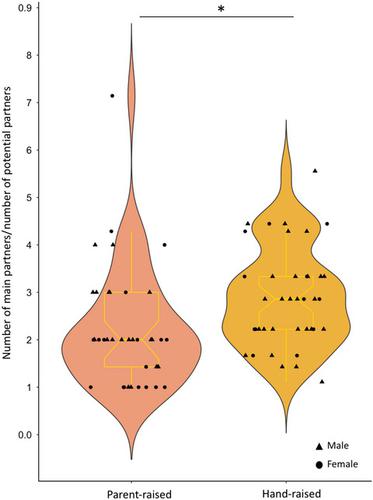Our official English website, www.x-mol.net, welcomes your
feedback! (Note: you will need to create a separate account there.)
Effect of rearing style on the development of social behaviour in young ravens (Corvus corax )
Ethology ( IF 1.3 ) Pub Date : 2020-03-18 , DOI: 10.1111/eth.13010 Palmyre H Boucherie 1 , Christian Blum 1 , Thomas Bugnyar 1, 2
Ethology ( IF 1.3 ) Pub Date : 2020-03-18 , DOI: 10.1111/eth.13010 Palmyre H Boucherie 1 , Christian Blum 1 , Thomas Bugnyar 1, 2
Affiliation

|
Abstract Early social experiences can affect the development and expression of individual social behaviour throughout life. In particular, early‐life social deprivations, notably of parental care, can later have deleterious consequences. We can, therefore, expect rearing procedures such as hand‐raising—widely used in ethology and socio‐cognitive science—to alter the development of individual social behaviour. We investigated how the rearing style later affected (a) variation in relationship strength among peers and (b) individuals’ patterns of social interactions, in three captive groups of juvenile non‐breeders consisting of either parent‐raised or hand‐raised birds, or a mix of both rearing styles. In the three groups, irrespectively of rearing style: strongest relationships (i.e., higher rates of association and affiliations) primarily emerged among siblings and familiar partners (i.e., non‐relatives encountered in early life), and mixed‐sex and male–male partners established relationships of similar strength, indicating that the rearing style does not severely affect the quality and structure of relationships in young ravens. However, compared to parent‐raised ravens, hand‐raised ravens showed higher connectedness, i.e., number of partners with whom they mainly associated and affiliated, but formed on average relationships of lower strength, indicating that social experience in early life is not without consequences on the development of ravens’ patterns of social interaction. The deprivation of parental care associated with the presence of same‐age peers during hand‐raising seemed to maximize ravens’ propensity to interact with others, indicating that besides parents, interactions with same‐age peers matter. Opportunities to interact with, and socially learn from peers, might thus be the key to the acquisition of early social competences in ravens.
中文翻译:

饲养方式对幼年乌鸦 (Corvus corax) 社会行为发展的影响
摘要 早期社会经历会影响个体一生社会行为的发展和表达。特别是,早年的社会剥夺,尤其是父母的照顾,可能会在以后产生有害的后果。因此,我们可以预期诸如举手之类的养育程序(广泛应用于行为学和社会认知科学)能够改变个体社会行为的发展。我们研究了饲养方式后来如何影响(a)同伴之间关系强度的变化和(b)个人的社会互动模式,在三个圈养的幼年非饲养者群体中,这些群体由父母饲养的或手工饲养的鸟类组成,或者两种饲养方式的混合。在这三组中,无论养育方式如何:最牢固的关系(即较高的关联和归属率)主要出现在兄弟姐妹和熟悉的伴侣(即早年遇到的非亲属)以及混合性别和男性-男性伴侣之间建立了相似强度的关系,表明饲养方式并没有严重影响幼年乌鸦的关系质量和结构。然而,与父母养大的乌鸦相比,手养的乌鸦表现出更高的连通性,即它们主要交往和附属的伙伴数量,但形成的平均关系强度较低,这表明早期生活的社会经历并非没有后果关于乌鸦社会互动模式的发展。在举手过程中,与同龄同伴在场相关的父母照顾的剥夺似乎使乌鸦与他人互动的倾向最大化,这表明除了父母之外,与同龄同伴的互动也很重要。 因此,与同伴互动并向同伴学习的机会可能是乌鸦获得早期社交能力的关键。
更新日期:2020-03-18
中文翻译:

饲养方式对幼年乌鸦 (Corvus corax) 社会行为发展的影响
摘要 早期社会经历会影响个体一生社会行为的发展和表达。特别是,早年的社会剥夺,尤其是父母的照顾,可能会在以后产生有害的后果。因此,我们可以预期诸如举手之类的养育程序(广泛应用于行为学和社会认知科学)能够改变个体社会行为的发展。我们研究了饲养方式后来如何影响(a)同伴之间关系强度的变化和(b)个人的社会互动模式,在三个圈养的幼年非饲养者群体中,这些群体由父母饲养的或手工饲养的鸟类组成,或者两种饲养方式的混合。在这三组中,无论养育方式如何:最牢固的关系(即较高的关联和归属率)主要出现在兄弟姐妹和熟悉的伴侣(即早年遇到的非亲属)以及混合性别和男性-男性伴侣之间建立了相似强度的关系,表明饲养方式并没有严重影响幼年乌鸦的关系质量和结构。然而,与父母养大的乌鸦相比,手养的乌鸦表现出更高的连通性,即它们主要交往和附属的伙伴数量,但形成的平均关系强度较低,这表明早期生活的社会经历并非没有后果关于乌鸦社会互动模式的发展。在举手过程中,与同龄同伴在场相关的父母照顾的剥夺似乎使乌鸦与他人互动的倾向最大化,这表明除了父母之外,与同龄同伴的互动也很重要。 因此,与同伴互动并向同伴学习的机会可能是乌鸦获得早期社交能力的关键。











































 京公网安备 11010802027423号
京公网安备 11010802027423号